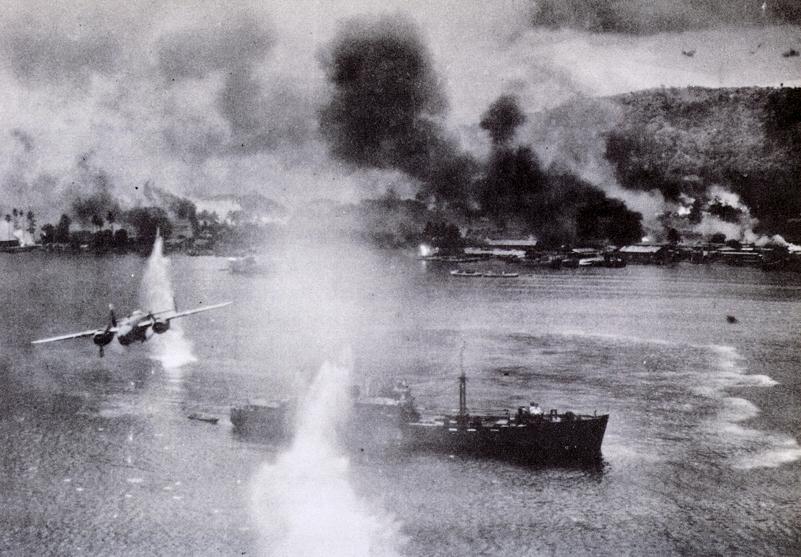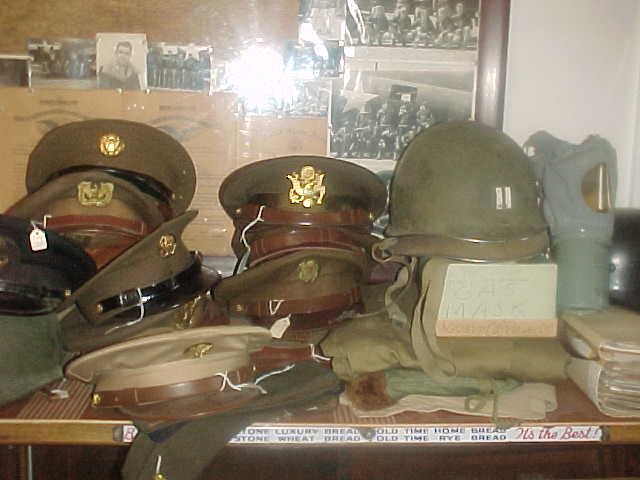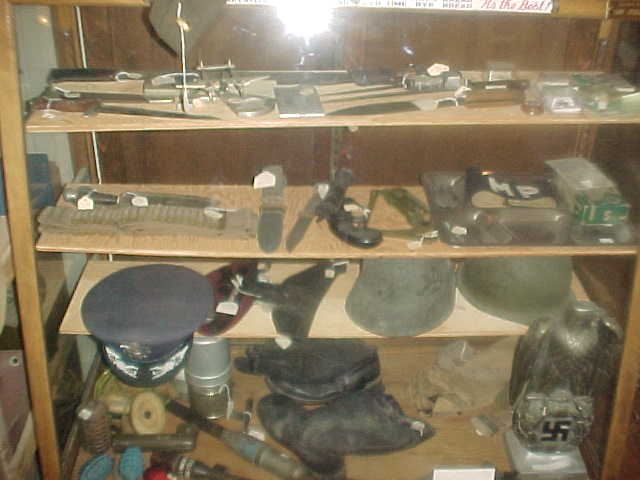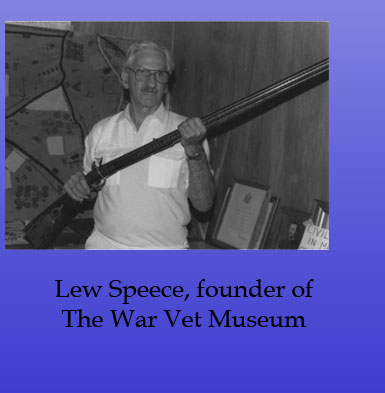



WORLD WAR II World War II: United States' Entry into the War When the Japanese seized Manchuria and then invaded China and began a drive to the south, they put their country on the road to war with the United States. But this aggression was at least in part a result of the West''s efforts to weaken Japan as an economic rival after World War I. The Great Depression, Japan''s population explosion, and the need to find new resources and markets to continue as a first-rate power were other causes of the invasion. Neither Japan nor America would have come to the brink of war except for the social and economic disruption of Europe after World War I and the rise of communism and fascism. These two sweeping forces brought about the tragedy of war between Japan and America. Unfortunately both countries were inept negotiators driven by paranoiac fear - Japan, fear of communism from both Russia and Mao Tse-tung, and America, fear of the "yellow peril." President Franklin D. Roosevelt brought their differences to a head on the night of July 26, 1941. After learning that the Japanese army had pushed into Indochina, he froze all Japanese assets in America. In consequence, not only did all trade with the United States cease, but the fact that America had been Japan''s major source of oil imports now left Japan in an untenable position. On September 6 an imperial conference was convened in Tokyo to decide on war or peace. Traditionally the emperor was supposed to remain silent. Instead Hirohito recited a poem of peace written by his grandfather. Startled, the military leaders promised to give first consideration to diplomacy. Prime Minister Fumimaro Konoye was forced to resign, and it was suggested that Gen. Hideki Tojo, the war minister, replace him. Only he could control the army. Tojo, although shocked by the offer, accepted and was ordered to "go back to blank paper," that is, to start with a clean slate and negotiate with America for peace. Despite protests from the military, a new offer was sent to Washington on November 20. Japan promised not to make any more aggressive moves south, and once peace was restored with China or a general peace in the Pacific established, all troops would be pulled out of Indochina. In the meantime Japan would at once move all troops in southern Indochina to the north of that country. In return, America was to sell Japan a million tons of aviation gasoline. Roosevelt was so impressed that he wrote out a reply in pencil and sent it to Secretary of State Cordell Hull. The secretary passed on copies to Chiang Kai-shek and Winston Churchill. Both protested so forcefully that the message was never sent to the Japanese. On November 26 news came of another Japanese expedition to Indochina, and the president "fairly blew up" when informed by Hull. In place of Roosevelt''s earlier message a harsh note was sent calling for Japan to withdraw all military forces from China and Indochina. It was regarded as an insult by the Japanese cabinet. It is possible that if Hull had sent Roosevelt''s original note Japan would have either come to some agreement with America or been forced to debate the issue, thus compelling postponement of an attack until the spring of 1942 because of weather conditions. By this time it would have been obvious that Moscow would not fall. This would dangerously weaken the Axis and cause the Japanese leaders to reconsider a Pearl Harbor attack at such an inauspicious moment. Then the implausible series of chances and coincidences that led to December 7 might not have occurred. A war that could possibly have been avoided now broke out because of mutual misunderstanding and language difficulties, along with Japanese opportunism, irrationality, pride, and fear and American racial prejudice, distrust, ignorance of the Orient, self-righteousness, and pride. Bitter political controversy had clouded the issue of war or peace in America. The interventionists, convinced that the nation''s future safety depended on its helping crush the aggressor nations, had pushed through Congress the Lend-Lease Act committing America to unlimited aid, "short of war," to the enemies of the Axis. The United States would be the "arsenal of democracy." The opponents of intervention included strange bedfellows: the right-wing America Firsters of Charles Lindbergh, Senator William E. Borah, and the German-American Bund, the "American peace mobilization" of the Communist and Labor parties, and the traditionally isolationist Midwest, which, though sympathetic to Great Britain and China, wanted no part of a shooting war. The bombs at Pearl Harbor brought Americans together, but the honeymoon ended when Roosevelt put the blame for Pearl Harbor on the commanders in Hawaii, Adm. Husband Kimmel and Gen. Walter Short. To quell protests the president appointed Supreme Court Justice Owen Roberts to head a Pearl Harbor inquiry. It found Kimmel and Short the principal culprits. Rather than ending the dispute this stirred vigorous protests, which resulted in several minor inquiries followed by major army and navy inquiries in the summer of 1944. When a Naval Intelligence officer testified that key messages indicating a possible raid on Pearl Harbor had been destroyed, and two army officers revealed that they had been forced to change testimony concerning Gen. George C. Marshall, both the army and the navy courts concluded that the principal blame lay in Washington. These conclusions were kept from the public. After the war Congress held public hearings that convinced the majority of Americans that Kimmel and Short should carry the burden of blame and that Roosevelt and Marshall had done their best to prevent war with a nation run by bandits. Most historians agreed with these findings, but there was evidence to suggest that the truth had been distorted by reversions of testimony, cover-ups, and outright lies. There was evidence, for instance, that President Roosevelt knew as early as December 2, 1941, that Japanese carriers were approaching Pearl Harbor. According to the testimony of Capt. Johan Ranneft, naval attaché of the Netherlands in Washington, he was informed by U.S. Naval Intelligence on December 2 that two Japanese carriers were halfway between Japan and Hawaii. Four days later they were some three hundred to four hundred miles from Pearl Harbor. He reported this to his government and wrote the details in his war diary. Of course, where the carriers were going and for what purpose was unclear. Roosevelt had been assured by Marshall that Oahu was the strongest fortress in the world and any enemy task force would be destroyed. The president, therefore, took a calculated risk and lost. This was understandable, but if he instigated a cover-up, as some evidence indicates, that was a serious offense. Perhaps the whole truth will never be known. ----------------------------------------------- World War II: Events and Results Adolf Hitler''s plan to seize all of Europe was set into motion on March 7, 1936, when he sent troops into the demilitarized Rhineland in violation of earlier treaties. The British did not seriously consider taking action and the French feared to do so. Ironically, the fuehrer had given orders to retreat if challenged by the French; thus, his occupation of the Rhineland was accomplished by default. Then followed moves into Austria, where he was greeted with enthusiasm, and into Czechoslovakia. Finally on September 1, 1939, his forces invaded Poland. This at last brought a declaration of war from England. As Poland was about to fall, the opportunistic Joseph Stalin occupied the eastern half of the country. On September 28, the two dictators signed a nonaggression treaty. With his rear thus protected, Hitler made plans to invade the West and in May 1940 sent troops across the borders of Belgium, Holland, and Luxembourg. Caught by surprise, the British and French were soon overwhelmed. The survivors of a British expeditionary force escaped across the English Channel, and the French capitulated on June 22. Now Hitler prepared to turn on his ally, Stalin, and so become the master of all Europe. When massive air raids on England failed to subdue the stubborn British, he sought to bring them to the negotiating table by capturing Gibraltar. This would not only keep the Royal Navy out of the Mediterranean, thus ensuring Hitler''s takeover of North Africa and the Middle East, but drastically lengthen England''s lifelines to the Far East. Britain would be forced to surrender and become a silent partner in his crusade against Jewish Bolshevism. All he needed was Francisco Franco''s permission to transport troops through Spain. But to his dismay, the Spanish dictator, though he seemed to agree, kept stalling. He did nothing, thus saving Gibraltar for England. Besides fear of aligning himself with a possible loser, Franco had a compelling personal motive. He was part Jewish. This setback was followed by another when Italy''s Benito Mussolini, who so far had avoided going to war, attempted to seize the Balkans and failed. Hitler felt compelled to do so himself before his attack on Russia could safely be launched; this forced him to postpone that invasion for at least a month. It finally began on June 22, 1941. Great advances were made until early October, and then sleet turned into snow and the mud froze. The cold intensified, and Field Marshal Gerd von Rundstedt radioed Hitler that his troops must retreat or "they will be destroyed." Instead the fuehrer ordered the attack to continue and was caught completely off balance on the night of December 4 when the Soviets launched a massive counteroffensive. Hitler not only lost Moscow but appeared destined to suffer Napoleon''s fate in the winter snows of Russia. Despondent, he admitted to Gen. Alfred Jodl that "victory could no longer be achieved." On December 7 the Japanese attacked Pearl Harbor, whereupon Hitler made still another mistake. He declared war on America, thus saving President Roosevelt from the risk of incurring the opposition of German-Americans by asking Congress to declare war on Germany first. Two hours after the first bombs fell on Pearl Harbor, Japanese planes hit Clark Field, the main U.S. base in the Philippines, wiping out half of Gen. Douglas MacArthur''s Far East air force. Within three days he had little air defense, and soon forty-three thousand Japanese troops landed 135 air miles north of Manila. MacArthur withdrew the bulk of his U.S.-Filipino forces to Bataan Peninsula and the adjoining island of Corregidor. After a bitter struggle the defenders of Bataan were driven back, and MacArthur was ordered to fly to Australia. On April 7 more than seventy-six thousand survivors on Bataan surrendered, and a month later Gen. Jonathan Wainwright, MacArthur''s replacement, surrendered the remaining troops in the Philippines. With Indochina, Thailand, and the chain of islands from Sumatra to Guadalcanal occupied, Japanese naval leaders decided that operations should be started against Australia and Hawaii. The army protested, but a surprise bombing of Tokyo by Col. James Doolittle in mid-April allowed Adm. Isoroku Yamamoto to prevail. Preparations were made to attack Midway Island, fifteen hundred miles northwest of Pearl Harbor. It was thought that this would all but wipe out the U.S. Pacific Fleet and leave Hawaii open to invasion. But the Americans had broken the Japanese code, and Adm. Chester Nimitz was ready. In the most crucial sea battle of the war, U.S. Navy and Marine airmen sank four carriers on June 4. America now controlled the Pacific. The Japanese commanders had fought the battle too carefully. In contrast, Rear Adm. Raymond Spruance, bold at the right moment, had launched his strike early. What gave Spruance the chance to win was Nimitz back in Pearl Harbor. He had made all the right decisions before a shot was fired. The spring of 1942 saw almost no change in Germany''s military situation. The eastern front remained stagnant, and Gen. Erwin Rommel was not quite ready for a new offensive in North Africa. Still determined to crush Russia, Hitler ordered a drive into the Caucasus, but rains held it up until June. Then, encouraged by an early success, the fuehrer made another mistake. He decided to mount a major attack on Stalingrad, an industrial city on the Volga, while continuing the drive to the Caucasus. By mid-September double victory seemed certain - and then the Soviets'' defense abruptly stiffened. November proved to be a month of disaster. Although Hitler had ordered him not to retreat "one inch" from North Africa, Rommel was forced to withdraw. An even more critical reversal occurred at Stalingrad. On November 22 two arms of a tremendous Soviet pincer movement encircled the entire Sixth Army, and more than 200,000 German troops along with a hundred tanks, eighteen hundred big guns, and more than ten thousand vehicles were caught in a giant trap. On February 2, 1943, the Germans capitulated. In the Far East the Americans were advancing on two fronts. While MacArthur slogged across New Guinea toward the Philippines, Nimitz''s amphibious forces were leapfrogging from island to island in the Pacific. On August 7, 1942, U.S. Marines landed at Guadalcanal, and after five months of deadly battle, the Japanese survivors were evacuated by ship. Nimitz''s forces continued toward Japan and by February 4, 1944, had reached the western limit of the Marianas, a chain of volcanic islands. The next target was the most strategic island of the chain, Saipan. On June 15, 1944, two Marine divisions landed on the west coast and began pushing across Saipan to link up with G.I.s of the Twenty-seventh Division. This brought swift reaction from the Japanese navy. Vice Adm. Jisaburo Ozawa was ordered to annihilate Admiral Spruance''s Task Force 58, but in a savage air battle on June 19 Ozawa lost 346 planes while shooting down only 50 Americans. In a bold stroke Japan''s naval power had been fatally crippled. This crushing defeat doomed the defenders of Saipan, and it was all over a month later. Close to 22,000 Japanese civilians - two out of three - perished, many of them by suicide. Almost the entire garrison - at least 30,000 - died. The Americans suffered 14,111 casualties. But the main island bastion protecting Japan''s homeland had been won by the United States. More important, the lowlands of southern Saipan offered a base from which massive B-29 bombing raids could be launched at the heart of the Japanese empire, Tokyo. While the Americans were taking Saipan, the Allies in Europe landed in Normandy on June 6. Hitler was taken by surprise, and within ten days the Allies had managed to land a million men and 500,000 tons of matériel. While the U.S. and British forces swept forward, an attempt to assassinate Hitler on July 20 almost succeeded. On August 25 Paris was liberated, and by late autumn the Germans were driven back to their own borders. Faced with disaster, Hitler made one final attempt to win in the West. The plan was to drive through the Ardennes and reach the English Channel, thus splitting the Americans and British. On the night of December 15 three German armies moved secretly to the line of departure. The next morning they struck, taking the Americans off guard. But after retreating for eight days, the U.S. troops regrouped and stopped the Nazis. The Battle of the Bulge soon ended with the Germans in full retreat. Two weeks later they suffered another defeat, and the Red Army crossed the Vistula. Now Hitler was being crushed from two sides. He had a momentary flash of hope on April 12 upon learning that President Roosevelt had died. But as the Soviets approached his bunker, he realized the end had come and shot himself. When he died so did National Socialism and the "Thousand-Year Reich." Adolf Hitler was probably the greatest mover and shaker of the twentieth century. Certainly no other human disrupted so many lives in our times or incurred so much hatred. He was driven by a number of forces. Blinded by gas in 1918, he had resolved that if he recovered his sight, he would abandon his goal of becoming an architect and enter politics. One night, like Saint Joan, he heard voices summoning him to save his country. All at once, as he recorded in Mein Kampf, "a miracle came to pass." He could see! He vowed he would become a politician and "bring Germany from the depths of despair to the greatness she deserved." Like millions of frontline troops, Hitler believed that they had been betrayed by those back home - strikers, malingerers, Jews, politicians, profiteers. They had forced the generals to surrender and accept the unjust and shameful Versailles treaty. Soon he became convinced that the greatest enemy to his crusade for a new Germany was communism, which he believed had been engendered by Jews. Anti-Semitism had flourished throughout Europe for centuries, and Hitler found many adherents. Obsessed by his dream of cleansing the Continent of Jews, he became a warped archangel. He had intended the elimination of Jews to be his great gift to the world. Ironically, it would lead instead to the formation of a Jewish state. In the Far East, also, there were impressive American victories. MacArthur, who had landed on Leyte in October 1944, had cleared the island of defenders by January 12, 1945. While he continued to advance toward Luzon, marines were wiping out the Japanese on the tiny but important island of Iwo Jima. After Okinawa was occupied on July 12, the defeat of Japan was inevitable. Convinced that a direct attack on the four main islands of Japan would be too costly, President Harry S. Truman ordered the dropping of atomic bombs on Hiroshima and Nagasaki. At an imperial conference Emperor Hirohito announced that the time had come to bear the unbearable. On August 15 he informed his people over a nationwide radio hookup that Japan was surrendering. World War II was, in fact, two separate wars. In the West Hitler had two aims: the first to seize all of Europe and North Africa so he could dominate the Mediterranean, and the second to wipe out communism and eliminate the Jews. His ally, Mussolini, had his own aims: domination of both the Mediterranean and the Balkans. As for the Allies, both England and France fought to preserve their countries and stabilize Europe. Roosevelt''s aim was broader: destruction of Nazism and establishment of democracy throughout Europe. The Soviet aim was to drive out the Nazis and emerge strong enough to continue communization of the world. In the Far East the Americans fought to rid themselves of a foe who some thought threatened their Pacific island possessions and their own West Coast. In addition they were eager to aid Chiang Kai-shek''s China. Some Americans also felt it was a good time to eliminate Japan as a serious economic rival. As for the Japanese, they attacked Hawaii because it harbored the Pacific Fleet and was perceived as a spear aimed at their proposed conquest of Southeast Asia for oil. The Allies won in Europe because of the blows inflicted on the Germans by the Russians, the endurance of the British, and the air and armaments superiority supplied by the might of American production. On the other hand, the victory in Europe resulted in a takeover of eastern Europe, despite Stalin''s promises at Yalta, and a cold war between the Soviets and the democracies. In Asia victory resulted in the takeover of China and Manchuria by the People''s Republic of China, chaos in Southeast Asia, and a division of Korea, with the Soviets in the North and the Americans in the South, that would lead to another war.














